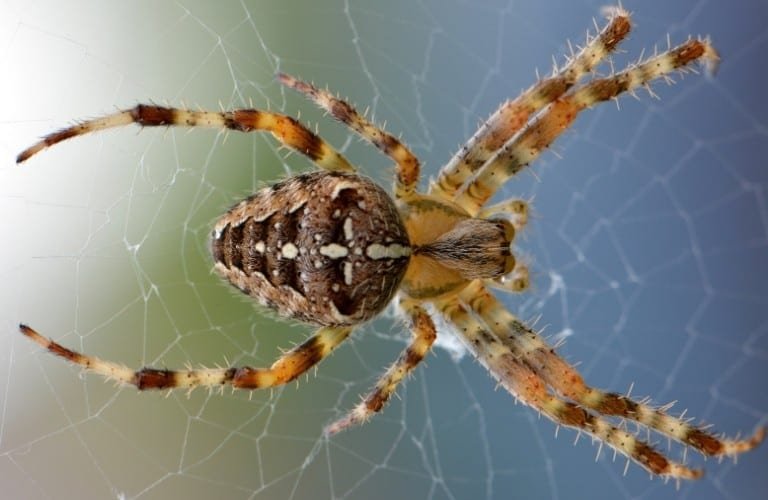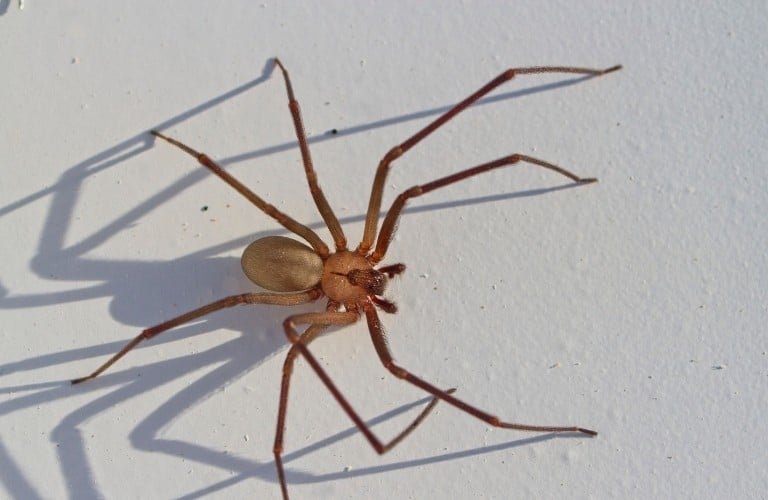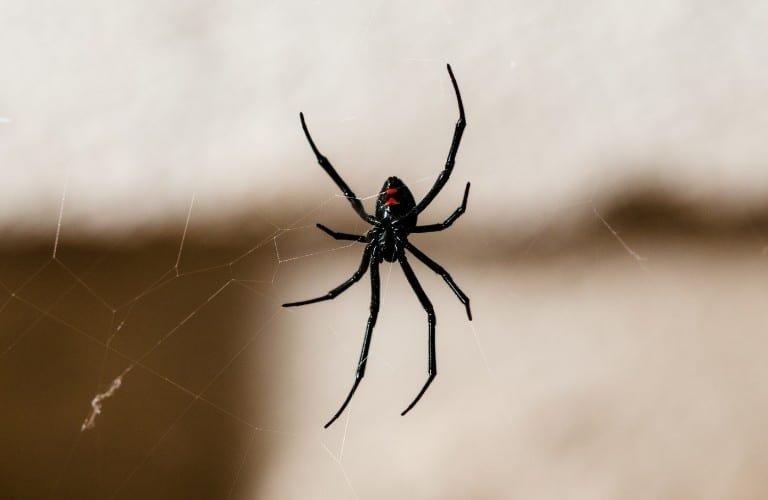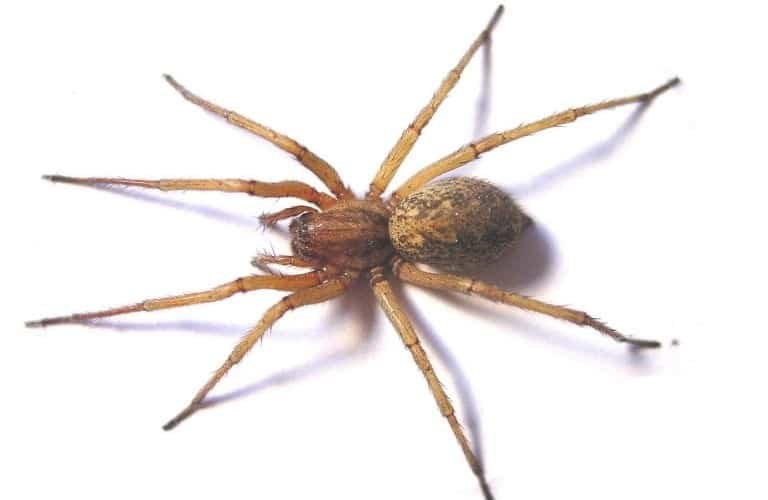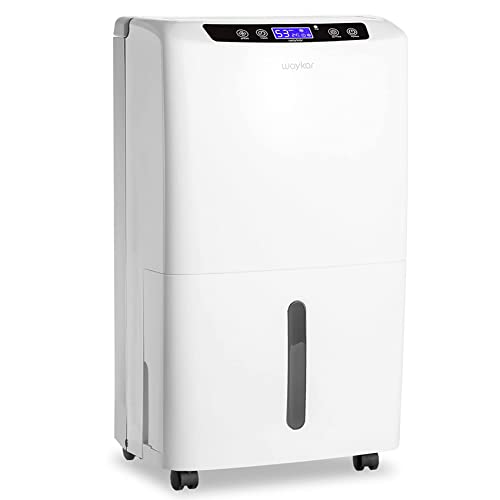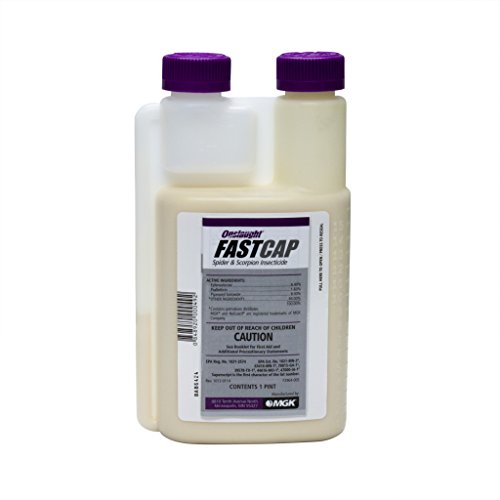Nobody likes spiders in their home. They’re creepy, form annoying webs, and occasionally bite. Yuck!
If you find yourself living with too many spiders that need to leave right now, there are some things you can try.
How can I get rid of spiders quickly? To eliminate spiders, clean your home frequently, and remove attractants for other pests. Use natural products like sprays, repellent pouches, and glue traps. Various pesticides such as residual, perimeter, and dusting products may be used if natural options fail.
Don’t miss out on our other spider articles. You’ll learn all about key prevention methods, the best elimination strategies, and products for eradication. Click here for more.
Identification
The term spider is a broad, general term for over 48,000 species of arachnids (term for an organism with eight legs).
That’s right, spiders are arachnids – not insects. You can discover how insects and arachnids differ here.
They are found on every continent except Antarctica. About 3,000 of these species roam North America.
Many spiders have rather drab coloration, such as shades of tan, brown, or black.
However, you’ll find that some, like the bright yellow banana spider, are actually quite pretty with vivid colors.
The best way to determine whether or not the pest in your home is a spider is by making sure it has eight legs.
Behavior
Spiders have appendages out of their abdomens that are called spinnerets. These spinnerets have up to six glands that release silk to produce webs.
Most house spiders catch their food by using those annoying, sticky webs.
The unsuspecting prey will fly into the web, where they are then either killed by the spider’s venomous fangs or wrapped up until they suffocate or starve.
Spiders, which are carnivores, then eat the dead prey. Specifically, spiders consume other bugs like moths, butterflies, centipedes, millipedes, flies, mosquitoes, and smaller spiders.
Most of the bugs that spiders eat are considered nuisances or pests, so some consider spiders to be helpful.
Spiders can go for weeks without eating, making it difficult to eradicate them because they don’t die easily.
Even though most spiders do not need lots of moisture (they get what they need from their prey), they spend time around water because it attracts their prey.
Since almost all spiders are carnivorous, they are attracted to pretty much the same things and can be treated very similarly.
Take away their food sources and they are much less likely to invade your home.
Because they do not eat humans, spiders will generally only bite people when they feel threatened.
Most spider bites are just painful, like most other bug bites, but some bites carry venom and can be dangerous.
Below are three of the most common venomous spiders in North America.
Brown Recluse
As their name states, brown recluses are almost completely brown in color, with a dark brown violin shape on their back. They typically live in dark, dry, warm environments.
Black Widow
Black widows are often found in firewood, in boxes, and other undisturbed locations.
They bite when threatened, and females have an easily distinguishable mark: a red hourglass shape on the underside of their abdomen.
Be sure to read this article to learn exactly what you should do if you find a black widow spider.
Hobo Spider
The hobo spider has a pattern of yellow markings on its abdomen. They build webs in holes and cracks and can be found in typically undisturbed locations.
If you cannot verify that the spiders in your home are not dangerous, stay away from the area, and call a professional exterminator.
Do not mess around with dangerous spiders.
Removal Methods
| Method | Estimated Cost | Natural | Odor Free |
| Natural repellent spray | $35 | ✅ | |
| Scent repellent pouches | Under $10 | ✅ | |
| Glue traps | $25 for bulk buy | ✅ | ✅ |
| Residual spray | $20 | ||
| Perimeter spray | $60 | ✅ | |
| Pesticide dust | $25 | ✅ |
The Best Way to Eliminate Spiders
For safety reasons, when attempting to eliminate spiders, always try natural approaches first before resorting to pesticides.
Wondercide Indoor Pest Control utilizes the powers of cedarwood and peppermint essential oils to both kill spiders and deter them from remaining in the vicinity.
It’s environmentally friendly and safe to use around your family and pets.
The best way to prevent spider infestations is to reduce or remove their food sources. Because spiders are generally carnivorous, they feed on smaller bugs.
If you can keep your home free from other bugs, spiders will not be attracted.
- Keep food in airtight containers so that roaches, ants, flies, and gnats cannot reach them.
- Make sure your home is dry since moisture attracts many types of pests that spiders consume.
- Seal cracks and crevices on the exterior of your home that might allow bugs to enter.
- Reduce outdoor lighting as much as possible, since light attracts bugs that are prey to spiders.
- Cover exterior vents with a fine mesh metal grating.
- Move hiding places at least 8 feet away from the perimeter of your home: garbage, compost piles, wood stacks, raked leaves, etc.
Basic Guidelines
People who actually like spiders are few and far between. To reduce the odds of running into spiders on occasion or, worse, having to deal with an infestation, follow the steps outlined below.
Clean Your Home
Spiders like to hide in safe, dark spots. This means that they enjoy a messy home, as there are plenty of locations in which to hide.
Make sure any trash, magazines, dirty clothes, tissues, blankets, shoes, pillows, and dirty dishes are picked up off the floor, and be sure to dust routinely.
Remember that spiders are attracted to warmth in addition to darkness, so anything that provides those two elements is attractive to spiders.
Once you have removed potential hiding spots, vacuum your entire home. Look closely for any webs, egg sacs, or spiders themselves.
Sweep them up, making sure to empty the bag into a container that you can tie or seal tightly (like a garbage bag).
While the force of the wind and heat should kill adult spiders immediately, egg sacs are more durable, and you do not want spider eggs hatching in your vacuum cleaner.
Don’t forget about your garage and any detached sheds or outbuildings when you’re cleaning up.
We show you how to easily remove webs from these areas and how to prevent spiders from returning in this article.
Get Rid of Food Sources
If there is an abundance of spiders in your home, it is because they know they can feed themselves.
Remove their prey so that they have no reason to be inside any longer.
Spiders eat bugs such as flies, cockroaches, mosquitoes, millipedes, moths, and many other bugs and insects. For the most part, this prey is attracted to food and moisture.
Do not leave any food out for long periods of time. Store anything edible in airtight containers (these on Amazon are ideal) or the refrigerator.
Remove any extra humidity in your home by using a dehumidifier (this one can remove up to 5 gallons of moisture per day), keeping windows and doors closed, cleaning up standing water, and fixing leaks efficiently.
Kill Spiders on Sight
Getting rid of spiders one by one might not seem like it is efficient, but is much better than allowing that spider to breed hundreds of young spiders.
The best way to kill a spider is to suck it up with a vacuum cleaner.
If you don’t have one handy, a good alternative (after you’ve determined that this particular spider is not venomous) is to use a cup to trap the spider.
Place a cup upside down on top of the spider. Once the cup is in place, use a piece of paper or cardboard to cover the upside-down mouth of the cup.
Carry the spider in this contraption to a toilet or an outdoor area at least 20 feet away from your home.
Note: Relocating is not recommended if you are dealing with a potentially dangerous spider, like the black widow.
Believe it or not, hairspray can actually be used to stop a spider in its tracks so you can quickly kill it. Find out why it works here.
If all else fails, squash the spider with a shoe or other firm object. Do not touch the spider or its remains with your skin, as some of its venom might cause an allergic reaction.
Clean up the remains with a paper towel or tissue.
Use Natural Repellents
There are a host of natural scents that you can use to repel spiders:
- Vinegar
- Eucalyptus oil
- Peppermint oil
- Citrus peels (orange, lime, grapefruit, lemon, etc.)
- Mint or eucalyptus plants
Pour vinegar into a spray bottle and dilute it with water at a 1:1 ratio. Spray it on entryways and around windows.
If you have essential oils handy, you might try eucalyptus or peppermint oil for a more pleasant scent than vinegar.
Try diffusing essential oils in problem areas of your home. This color-changing diffuser has two mist settings and will automatically shut off when the unit runs out of liquid.
Another option is to create an essential oil spray by diluting 15 to 25 drops of oil with 2 ounces of water in a small spray bottle.
Citrus peels have shown some ability to repel spiders, but are unattractive and are not powerful for more than a few days before they dry up.
Mint or eucalyptus plants do not emit a strong scent but might provide some protection against spiders.
Place these scents near doorways, windows, or other places where spiders are a problem.
Use Spider Traps or Sprays
If these natural solutions do not work or do not work quickly enough, feel free to purchase products such as spider traps or sprays. Find our recommendations below.
Natural Solutions to Get Rid of Spiders
Though spiders often eliminate other pests (moths, flies, mosquitoes, etc.), you probably don’t want them overtaking your home. If this is the case, give these natural solutions a shot.
| Preview | Product | Rating | |
|---|---|---|---|

|
Wondercide - Indoor Pest Control Spray for Home... | Check Price on Amazon | |

|
J T Eaton 076706844002 Spider and Cricket Glue... | Check Price on Amazon |
Repellent Spray: Wondercide Indoor Pest Control
There are a variety of products that are made to spray around your home to repel spiders. Most of these are designed to smell good to humans while being unattractive to spiders.
As has already been mentioned, spiders follow their food into your home. So, look for a product that repels not just spiders but other bugs that might attract spiders.
Wondercide is known for its products made with natural ingredients.
Wondercide Indoor Pest Control is made with essential oils specifically designed for the home and kitchen area. Apply to windows, doors, counters, or baseboards as frequently as desired.
It is immediately safe for pets and children, and the fresh peppermint scent is quite pleasant. This product kills and repels all types of bugs, like ants, roaches, flies, fleas, mosquitoes, and moths.
Scent Repellent Pouches: Stay Away Spiders
If you’re looking for an environmentally friendly, non-invasive way to get rid of spiders, consider a scented repellent.
These products come in many shapes and sizes but typically come in pouches. They have a special scent that repels spiders and lets you know if it is still potent.
Because these products are in pouches and only have a certain scent radius, they are not very effective in large rooms.
If you are in a dorm room, apartment, or small house or if you only have a spider problem in certain rooms, these repellents will do the trick.
Stay Away produces a line of repellents for a variety of pests, all with natural ingredients and no chemicals.
Stay Away Spider Pouches contain citronella, lemongrass, and rosemary essential oils, giving the pouches a delightful scent.
With just a whiff of the plant-fiber pouch, you’ll know if it’s time to replace it with a fresh one, and best of all, there’s no messy application process.
Just place a pouch where you often see spiders, and you’re done.
Glue Traps: JT Eaton Pest Catchers
A simple, low-tech solution to your spider problem, glue traps might be effective in your home. These devices are usually made of paper or cardboard and have a strong adhesive on one side.
Look for a product that has scented glue that attracts spiders (and other bugs) onto the adhesive. Some products fold into boxes that you can set up to avoid having to see all the dead bugs.
These products should not be used in any situation with kids or pets, as the glue is very sticky and could cause problems if used unsafely.
They also require that you dispose of the filled traps, which is not ideal for some people.
Pest Catchers are for indoor or outdoor use and are pre-baited, meaning they come with a scented glue to attract spiders (most people do not notice any odor) and other types of pests.
They come in tray form, making it impossible for bugs to crawl out once stuck and easy for you to dispose of.
With this particular bundle, you’ll receive five packs of traps with four traps in each for a total of 20 – plenty to place strategically around your home.
Pesticide Solutions to Get Rid of Spiders
If you have exhausted all of the natural recommendations, you might be wondering what kills spiders instantly.
Many people opt to disperse pesticides in a fine mist to cover a large area quickly by using foggers. This can definitely work, but you need to make sure that the product you choose is effective against spiders.
Check out our article “Best Fogger for Spiders” to see which types will actually work and which foggers we’ve found to be the best.
Residual Spray: Wet & Forget – Miss Muffet’s Revenge
A residual spray retains its potency for a long period of time, often needing just one application to take care of the problem. Compared to contact sprays, a residual spray is designed to be a long-term solution and does not need to be sprayed directly on the pest. Residual sprays generally work for crawling, non-flying pests (like spiders). It usually uses chemicals to harm the pests.
Miss Muffet’s Revenge guarantees up to 12 months of protection as a residual spray. It can also be used as a contact spray, however, and it may be applied directly to spider webs as well as any areas you’d like to protect. This product comes with its own spray mechanism featuring a 10-foot cord and may be used indoors and outside.
Perimeter Spray: Onslaught FASTCAP
A perimeter spray is a type of residual spray that is specifically designed to be applied to the perimeter of a lawn, house, or room. It creates a barrier around that area to keep the pests from coming inside. Perimeter sprays, especially those applied outdoors, are typically for major infestations.
Onslaught has made a powerful pesticide specifically for spiders and scorpions. As a residual pesticide, FASTCAP is designed to be powerful for a long time. Even though it is potent and long-lasting, it is safe for use in homes and around food preparation areas as long as used as directed. This product can be applied both indoors and outdoors and will eliminate many types of pests, not just spiders.
Pesticide Dusts: Delta Dust
A pesticide dust is a type of residual pesticide that comes in a dust form. Spread it into cracks, crevices, or other tough-to-reach spots.
Because it is a dry powder, it is safer for use on some types of materials than liquid spray.
Dusts tend to be high in chemical concentration, so they are not for use in places where kids and pets live. Look for waterproof dusts that don’t clump when humid.
Delta dust is resilient but is safer to use in homes than most other dusts. It can be poured into drainpipes or other locations that are sometimes havens for spiders. This particular dust can be used against bed bugs, centipedes, and a variety of other pests in addition to spiders. Because it is 100% waterproof, it will not clump or absorb moisture. If left undisturbed, it will continue to kill for up to eight months.
Safety Precautions When Using Pesticides
When using any type of chemical, like pesticides, always follow the directions on the label.
Wear proper personal protective equipment and keep the product out of the reach of children and pets.
Do not ingest any chemical and do not mix with other products unless specifically instructed.
When to Call a Professional Exterminator
If you are unable to verify if the spider is venomous or not, vacate the area and call a professional exterminator.
Similarly, if you believe the infestation is too large to control with the methods listed above, or your living situation dictates that you cannot use self-applied chemical pesticides (you’re renting your home, someone in your household is allergic, etc.), call a professional who can help you determine the best course of action.
Would you like even more prevention tips and elimination advice? Head over to our spider page to access all of our spider articles.


